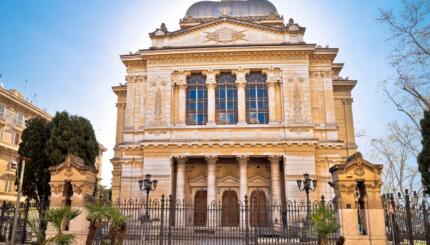Most affiliated Jews in the United States identify as either Conservative or Reform. But in Israel, for a variety of historical and political reasons, the reality is very different.
The Conservative movement in Israel, called the Masorti movement, was founded in 1979 and now includes 50 synagogue congregations and havurot (lay-led prayer and study communities). The movement has 50,000 Israeli affiliates of its congregations and national programs, and roughly 125,000 Israelis participate in their programming yearly. Israel is home to a Masorti kibbutz and a moshav (communal settlement) where many members affiliate with the Masorti movement, and where prayer services, lifecycle events, and communal celebrations are conducted according to Masorti principles. The Masorti movement has a youth movement, Noam, and a rabbinical seminary, the Schechter Institute, which ordains about five rabbis each year. 
The Reform movement in Israel, called the Israel Movement for Progressive Judaism, includes 30 synagogue congregations, two kibbutzim in the south, and one village in the north. Noar Telem is the Reform youth movement. The Hebrew Union College-Jewish Institute of Religion in Jerusalem grants degrees and trains Reform rabbis, and like the Schechter Institute, ordains about five rabbis each year.
Reform and Conservative leaders believe that the liberal movements could grow in numbers and influence, but that Israel’s Rabbinate–an Orthodox institution that controls nearly all religious matters in the state–significantly curtails their activities.
Personal Status Issues
For example, the Orthodox Rabbinate has exclusive control over marriage between Jews in Israel, so marriages performed by Reform or Conservative rabbis in Israel are not legally recognized, and there is no option for civil marriage for Jews in Israel. Israelis who wish to marry in a Conservative or Reform ceremony have several options. They can marry in a private Reform or Conservative ceremony in Israel, and have a civil marriage abroad, which is then legally recognized in Israel. Or they can marry abroad in a Reform or Conservative ceremony which will then be recognized in Israel.
Conversion, similarly, is under the exclusive control of the Orthodox Rabbinate, which does not recognize non-Orthodox converts as Jewish. This means that non-Orthodox converts cannot marry in Israel. Change has been made, however, in terms of legal recognition of non-Orthodox converts in Israel for purposes of immigration.
In 1989, the Supreme Court ruled that Jews who converted in any conversion outside of Israel are recognized as Jews under the Law of Return. Then in 1995, the Israel Religious Action Center (IRAC), the legal advocacy and public policy arm of the Progressive movement, won a precedent-setting case which ruled that Israelis who convert in a non-Orthodox conversion in Israel can be registered as Jews by the registrar of the Ministry of Interior, an act which has purely statistical consequences but is symbolically significant.
Most recently, in 2005, IRAC won another case where the Supreme Court ruled that “leaping converts” who study for conversion in Israel but then complete the process abroad can be included as Jews under the Law of Return (unlike the 1989 decision which only recognized non-Orthodox converts who went through the entire process abroad).
Despite their recognition as Jews for the purposes of immigration and registration, the Orthodox rabbinate continues to bar non-Orthodox converts from marrying in Israel and receiving a Jewish burial.
Access to Holy Sites
The Masorti and Progressive movements in Israel also struggle for access to the Kotel–the prayer space at the Western Wall of the Temple Mount. When Israel conquered East Jerusalem in 1967, Levi Eshkol, Prime Minister at the time, gave control over the Kotel to the Chief Rabbinate, who soon put up a mehitzah separating spaces for men and women to pray. At the end of the 1990s, the Masorti movement conducted prayer services at the upper end of the Kotel plaza for Shavuot and Tisha B’Av, but some Orthodox Jews were outraged and attacked the worshippers.
The Masorti movement petitioned the Supreme Court, which ruled that egalitarian prayer services could be conducted at Robinson’s Arch, an archaeological site further along the Western Wall set apart from the popular plaza. This compromise was an accomplishment for the non-Orthodox movements, but not completely satisfactory for liberal Jews–they only have access to the site for a limited number of hours each day, and they must provide their own prayer books and Torah scrolls. Still, over 20,000 people each year worship and conduct Bar and Bat Mitzvahs in egalitarian services at Robinson’s Arch.
Money Talks
In Israel, the government funds religious educational programming, rabbis’ salaries, and synagogues, when approved by the official local rabbinate and religious council. This funding, however, has historically been denied the Progressive and Masorti movements. This means that Israeli Jews who want to join a non-Orthodox synagogue must pay taxes supporting Orthodox institutions, and then membership fees supporting their own religious institutions. Membership fees make it more difficult for non-Orthodox synagogues to attract members in a country where people assume they will not have to pay to attend religious services and programs.
In 2006, IRAC petitioned the Supreme Court to provide a salary for Rabbi Miri Gold, a Reform rabbi, but the case is still pending. Rabbi Gold is one of 16 rabbis in the Gezer region. The 15 other rabbis, all Orthodox men, receive a government salary, while Rabbi Gold does not, even though she serves as rabbi for a large number of Gezer residents and is recognized as a rabbi by the Municipal Council in Gezer.
IRAC succeeded, however, in securing state funding for six non-Orthodox synagogues, and the Reform movement dedicated Israel’s first government-funded non-Orthodox synagogue in 2008, located in Modiin, a town between Jerusalem and Tel Aviv.
Public Attitudes
Change in the Israeli government’s treatment of the non-Orthodox movements is slow, but it is happening. The question remains, however, whether legal barriers are the only impediments to the liberal movements’ growth and success. Professor Daniel Elazar, founder of the Jerusalem Center for Public Affairs, argues that public attitude, not government policy, is the main obstacle to the liberal movements’ success in Israel.
Many Israelis see the Masorti and Progressive movements as inauthentic, and they do not appreciate the changes that these movements have made to traditional Judaism. The pluralistic and egalitarian nature of American Judaism is foreign to these traditionalists–many of whom personally lead secular lives. Historically, a large percentage of the membership of the liberal movements in Israel has been North American.
In recent years, however, these percentages have begun to shift, and today 60 percent of Masorti members are native-born Israelis or from non-English speaking countries.
The liberal movements are slowly growing and gaining more support in Israeli society, but only time will tell whether they are able to overcome public attitudes and government policy in order to reach a large proportion of Israelis in the future.
Kotel
Pronounced: KOH-tell, Origin: Hebrew, Western Wall in Jerusalem, Judaism’s holiest site.
Torah
Pronunced: TORE-uh, Origin: Hebrew, the Five Books of Moses.


